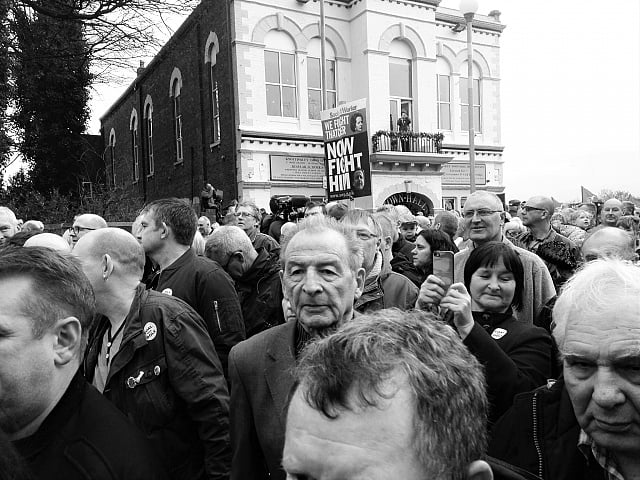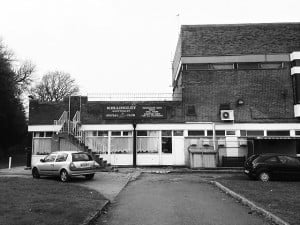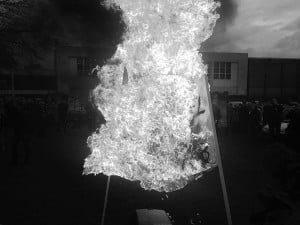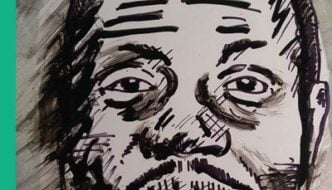Interview: Lucy Smith, photographer and daughter of a Kellingley Colliery miner
February 14, 2016
 Kellingley Colliery Mine was one of the oldest functioning mines remaining in England. On the 18th of December 2015 the mine was closed. Thousands of miners have lost their jobs, and the community in Knottingley and the surrounding towns have lost a massive part of their identity and function.
Kellingley Colliery Mine was one of the oldest functioning mines remaining in England. On the 18th of December 2015 the mine was closed. Thousands of miners have lost their jobs, and the community in Knottingley and the surrounding towns have lost a massive part of their identity and function.
Artist Lucy Smith, who is studying for a BA in Fine Art at Leeds Beckett University, captured the closing marches through her photography, capturing some extremely powerful images of the detrimental effects of the closure of the mines on the community. The images could be compared to those from the infamous 1980s miners’ strike protesting Margaret Thatcher’s closure of many mines across England, costing millions of miners not only their careers and leaving them with little compensation.
The cuts have left a large number of miners unemployed and deprived them of the craft to which many of them have dedicated their lives. They received just 12 weeks’ compensation pay and have been left with a skill they can now no longer use. Holly Wyatt spoke to Lucy about the inspiration for her project and the experience of attending the marches.
What inspired you to cover the mining marches?
The issue and slow destruction of the working class communities is one that I hold close to my heart. After the reign of Margaret Thatcher, working class Britain became abandoned and now many argue that “working class” is no longer valid terminology within Britain’s social class hierarchy.
On a personal level, my father, Peter Smith, as well as my grandfather and generations throughout my family history have all worked throughout their lives as miners contributing to turning a vital cog in what was Great Britain’s booming industry. Witnessing first-hand the closure of mine after mine and how it has affected my family and our community is what has led me to be so passionate about the subject. The men who have worked all their lives to keep Britain’s economy alive have been thrown aside for cheap imports and lesser products from different countries. With the final closure of Britain’s last mine the bottom of the mining barrel has officially been scraped and thrown aside, leaving men and families with no prospects and truly a lost trade. A very sad moment in our country’s history.
 The images you have captured are extremely emotive. Do you feel you managed to portray the emotion that was felt throughout the crowds?
The images you have captured are extremely emotive. Do you feel you managed to portray the emotion that was felt throughout the crowds?
When I look at my photographs I do feel that on a whole I managed to capture the atmosphere of the day and I feel that I have captured the movement and unity of the crowds. Coming together as colleagues as well as good friends, retired miners and redundant miners sharing in their sorrow for the loss of their livelihood. Few seemed angry but those who were and came together in protest of the Tories. I was lucky enough to be in a good position to capture those moments also.
How many people roughly would you say marched through Knottingley?
Although the march was short, stretching from Knottingley town hall to the Social Club, the turnout of supporters was very humbling. Even my mother commented that she was rather sad to see that the turn out for the closure of the mine was greater than that of the protests to keep the mine open. When amidst the masses it felt as though everyone in the town had come to watch or march with us. In reality I believe the turnout was between two and three thousand people which was amazing, despite the struggle to go and get a drink in the social afterwards!
What will be the impact now on the miners and their families?
The closure and finalisation of such massive industries is so devastating for these communities and no programmes have been put into place to show these men how they can adapt the skills they have spent their lives learning. Now those skills that could be used to start new careers in contemporary Britain are wasted.
This is all these men know. Most have been mining since they were sixteen years old and from what my father has said his friends have been feeling anxious about having no experience. These men also suffer confidence issues for no longer being able to support their families – only having mining for thirty seven years on your CV is barely going to throw you straight into a new career. These men have a journey to face and it won’t be easy. The one positive thing these men can take from this when looking on the bright side is that they have become a crucial part of Great Britain’s history.
 Do you believe the compensation that has been put in place for miners and their families is satisfactory?
Do you believe the compensation that has been put in place for miners and their families is satisfactory?
Although the redundancy money for the miners is substantial, no form of compensation or money can account for the fact that these men have lost their livelihoods. Redundancy money for my father was satisfactory for that of a man who has worked as a miner for thirty seven years, however I cannot account for those other men who have dedicated less time to the mines, and opinion on what can be classed as satisfactory will vary from person to person.
What more needs to be done (and realistically can be done) to help support the miners and their families?
What needs to be done, what can be done, and the reality of what will be done is in my opinion unjust. Not just these men from the mines but any person being made redundant can see a change in the perspective of their own future with simple programmes. Programmes that can be put into place for those who need them. Programmes such as those I mentioned earlier, where people can be advised on how to adapt the skills they know so well, into different working environments.
Handbooks on how to make simple day-to-day spending cuts while times without a job will be hard. These are just a few of my own ideas. Someone with a concentrated education, and understanding of careers and advice could put these simple support systems for these men into place so easily. I find the fact that this has not been done or been made widely available greatly discouraging.
Lucy’s work is currently being exhibited The Lamb & Flag as part of Exhibit Leeds. A limited amount of prints are for sale. If you are interested please contact The Lamb & Flag.
Filed under: Art & Photography
Tagged with: coal, Kellingley Colliery Mine, Knottingley, Leeds Beckett University, Lucy Smith, port talbot, steelworks, Thatcher, The Lamb & Flag



Comments